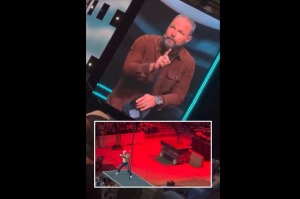An empty nest? Now's the time to ramp up savings — and to have fun

Raising a family is a great privilege and a high calling. But it isn't cheap. There seems to be a never-ending cycle of child-related expenses: clothes, food, doctor visits, family trips, piano lessons, college. But it's not never-ending. One day it comes to a halt, and mom and dad find themselves as "empty nesters."
Typically, as child-rearing expenses disappear, a couple's cash-flow situation improves, perhaps remarkably (assuming household income remains steady). What happens next isn't hard to predict: Many empty-nester couples, now with more money in the bank than they're accustomed to, embark on spending sprees that claim most of their "newly found" wealth.
There is nothing wrong, of course, with spending money on a long-awaited vacation or even dropping some cash on a home-remodeling project. But consider the larger picture. If you reach the empty-nest stage behind on saving for retirement — and that's quite common — it's wise to develop a plan for how much of your "extra" money to spend and how much to save for years yet to come.
Take advantage of the circumstances
The reason many empty-nester couples haven't saved enough for retirement is simple: setting money aside during the child-raising years is tough! The very real needs of the present seem to far outweigh the necessity of saving for a distant and fuzzy future.
Once the children are on their own, however, couples have a great opportunity to ramp up their savings and make significant progress toward building an adequate nest egg. But most don't do that.
Using government data, Boston University's Center for Retirement Research found that, on average, early-stage empty nesters increase their retirement-related savings rate by only the smallest of margins — less than 1%. On a percentage basis, they make better progress when it comes to accelerating mortgage payments, increasing such payments by 2% (e.g., an extra $20 dollars on a $1,000-a-month mortgage).
Researchers concluded that most of the money freed up when child-rearing expenses end is spent on short-term consumption rather than on longer-term preparation.
Striking a balance
As with many decisions about how to deploy financial resources, the spend-vs.-save choice facing early-stage empty nesters doesn't have to be an either-or determination. It's possible to strike a wise and reasonable balance between "We'll use this money to enjoy ourselves" and "We will set this money aside for the future."
Want to travel? Set a budget for that (by researching prices for flights, accommodations, and ancillary expenses), save enough from your newly expanded cash flow, and bon voyage! But at the same time, determine how much you're going to set aside for the future.
To ensure follow through, "automate" the implementation of your savings plan — both for your "fun" and your retirement. You could, for example, start auto-transferring $250 a month to a dedicated "vacation" account. After 12 months, you'd have $3,000 set aside for a trip to Europe or the Holy Land or wherever! At the same time, you could be transferring $750 a month to a retirement account, resulting in an extra $9,000 a year in retirement savings.
(Note: For 2019, the annual IRA contribution limit for a person age 50 and older is $7,000. However, a husband and wife can each have an IRA, making the combined limit $14,000. The 50-and-over 401(k) limit is $25,000.)
Suppose you have 10 years between the time you become an empty nester and your planned retirement day. Over that decade (continuing the example from above), you could set aside an additional $90,000 toward your retirement. Even with a limited period in which to grow and assuming only a 6% rate of return, after the full 10 years that $90,000 would be worth roughly $120,000 — a significant addition to your nest egg.
Ramp it up still more
To free up even more money during the early empty-nest years, consider the following:
Downsize Your Dwelling: If your housing situation is chewing up a lot of your cash — not only for the mortgage payment but also for taxes, insurance, and utilities — maybe it's time to find something cheaper. Or, alternatively, if you don't want to move but you have extra space in your current home, rent out a room, either to a full-time tenant or an occasional traveler (such as via Airbnb).
Streamline Your Insurance: Now that your children are grown, you can drop them from your auto and health policies. You may want to reduce your life insurance amount, too.
Sell a Car: Can you get by with one car instead of two (or two instead of three)? Getting rid of a car will save a big chunk of money currently spent on repair, insurance, and auto-related taxes.
Sell Other Stuff: You likely have things you no longer need that someone else might be willing to buy. Possible sale items: a bedroom suite, sports equipment, and musical instruments.
Opportunity knocks!
The decade or so between the end of the childrearing years and the start of retirement can offer a married couple an unmatched opportunity to enjoy "just-you-and-me" experiences of travel and fun. At the same time, those years present the final opportunity for couples to prepare financially for the many years (potentially) that will come after — a quite different season of life that could extend well into their 80s or 90s.
Don't squander either opportunity.
© Sound Mind Investing




























